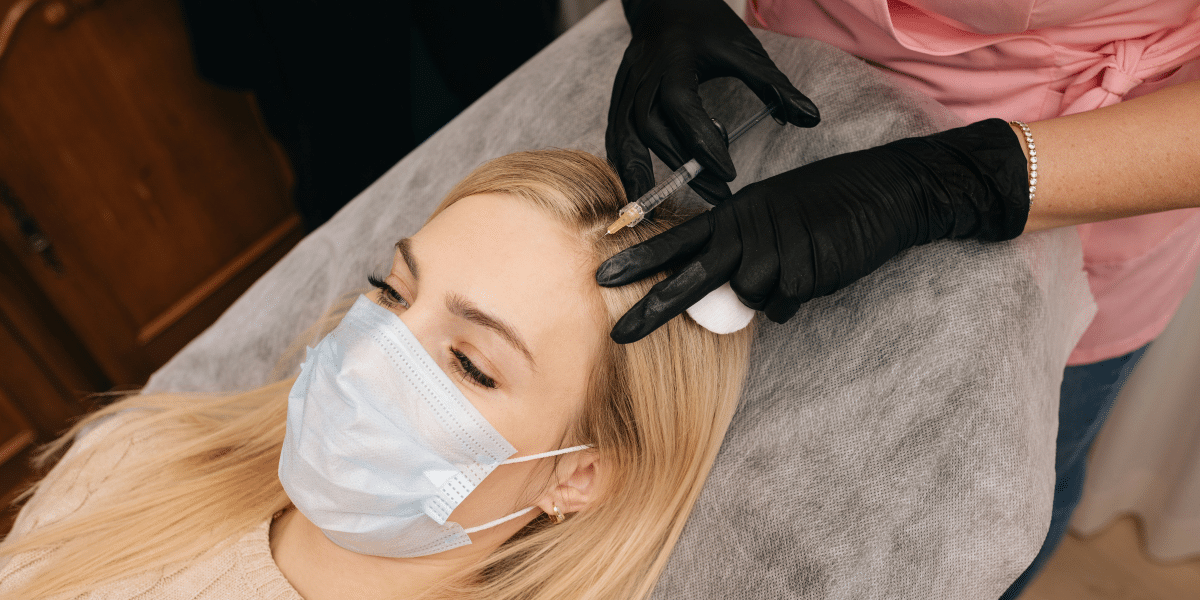Boston Hair restoration can be just what you need to regain your confidence and become back involved in life. Our understanding at Boston Hair is that it is essential to feel and look your best. Thankfully, we provide various treatments meant to accomplish precisely that. Find out if our services can meet your needs.
What is Hair restoration?
The procedure known as hair regain replaces lost hair to give the scalp a fuller, more colorful appearance. These operations may include surgery or not. Boston Hair provides the following techniques:
- Surgery for Hair Transplant
- Treatment for Hair Reconstruction
- Non-Surgical Hair Replacement
Make an appointment for a consultation to find the best treatment for you.
Recognizing Hair Loss: The Cause of the Issue
Selecting the best Boston Hair Restoration strategy requires understanding the underlying causes of hair loss, which does not occur suddenly. Below is a summary of the typical offenders:
- Male-pattern baldness and female-pattern hair loss, often known as androgenetic alopecia, are the most common kinds of hair loss that affect people of both sexes. It is inherited, and the hormone dihydrotestosterone (DHT) is a major contributing factor. DHT causes hair follicles to shrink, which shortens the growth phase, causes shrinkage, and ultimately results in hair loss.
- Effluvium telogen: The following conditions may cause this transient hair loss: stress, disease, malnutrition, delivery, or medicine. Hair regeneration usually happens on its own after the underlying problem is resolved.
- Alopecia Areata: This autoimmune disease causes patchy hair loss on the scalp, brows, or beard by interfering with the hair growth cycle. Although a solution is unknown, available treatments reduce the immune system’s attack on hair follicles and promote hair growth.
- Scarring alopecia, also known as cicatricial alopecia, develops due to burns, wounds, infections, or other medical problems that leave permanent scars on the scalp and inhibit hair development in particular regions.
How to Diagnose Hair Loss
A correct diagnosis is necessary to be successful. For a comprehensive evaluation, consult a board-certified dermatologist or hair transplant surgeon. Finding Thismay entails a physical examination of the scalp, a scalp biopsy, and blood tests to find any underlying medical issues.
Cost of Boston Hair Restoration
Each method has a unique cost determined for each. Since every patient is different, they should receive customized care to meet their specific needs. During your consultation, we will assess your unique price. In this discussion, we can also talk about your payment option.
Could I Benefit from Boston Hair Restoration?
If you are losing hair and are worried about your health, you might be a suitable candidate for this, as there are many different techniques available.
Nevertheless, it is best to arrange a consultation to ascertain candidacy. We will address your issues and devise a strategy to assist you in realizing your restoration objectives during this period.
What Takes Place When Hair Is Restored?
Your chosen treatment will determine how long it takes to recover after treatment. However, our procedures are designed to reduce recuperation time as much as possible so you can quickly resume your regular activities.
How Do You Recover From Boston Hair Restoration?
The stages involved in our procedures vary depending on the technique selected. However, you can be sure that you will be in capable hands the entire time. During your consultation, we will discuss what to anticipate depending on your particular procedure.
What Is the Duration of Results?
In general, results from surgical hair restoration boston may persist longer than non-surgical methods. Nevertheless, our goal is to produce the most durable outcomes, and during your appointment, we will discuss what to anticipate from your particular surgery.
At Boston Hair, we recognize the significance of hair for a positive skin image. For this reason, we are pleased to provide the people of Boston, Massachusetts, and the neighboring regions in Massachusetts and Rhode Island with a comprehensive selection of methods.
Look no further if you’ve been looking for a team you can trust. To get started on the treatment path, call our office at this time to arrange your consultation.
Locating the Correct Boston Clinic: Knowledge Meets Trust
There are several respectable hair restoration clinics in Boston. The following will help you sort through your alternatives and select the one that best meets your needs:
- Qualifications of the Surgeon: Look for a facility with dermatologists or surgeons with board certification who specialize in this field. Examine their background, credentials, and testimonials from previous clients.
- Range of Services Provided: Does the clinic offer alternatives other than surgery? Select a facility that offers many services to meet your unique requirements.
- Technology and Techniques: Verify if the hair transplant clinic uses cutting-edge technology (such as ARTAS robotic FUE) for imaging, diagnostics, and treatments.
- Patient Consultation and Communication: Select a clinic that values a comprehensive consultation so that you can freely voice your concerns and goals.
- Before and following surgery: Ask about follow-up visits, post-operative care guidelines, pre-operative instructions, and the clinic’s support system.
- Cost Transparency: Before making any decisions, get a thorough cost analysis of the suggested treatment plan. If finance is available, talk about it.
What Takes Place If My Hair Surgery Doesn’t Work Out?
If you’ve had surgery in the past but weren’t happy with the results, Boston Hair can help you get the results you wanted with revision surgery at our cutting-edge facility.
Technical mishaps, inadequate planning on the side of the surgeon, and unforeseen complications frequently bring on unpleasant and unsuccessful results.
Technical Mistakes and Difficulties
If your scalp appears ridged, tightened, blocked, or cobblestone-like, various reparative surgical techniques can significantly improve your outcomes. Technical problems usually occur when a doctor performs transplants using subpar methods.
If the hair follicles are positioned at improper angles or depths, the freshly transplanted hair will grow in the wrong directions, and each transplant will appear unnatural or pitted.
Our surgeon’s care, surgical accuracy, and commitment to achieving the most natural-looking outcomes make us unique. Each hair follicle that is removed, processed, and transplanted is done so with the highest care and precision.
Boston Hair’s cutting-edge techniques provide a hairline precisely where a natural hairline would be, with little to no scarring or swelling. We determine each patient’s particular requirements and create a personalized treatment plan that helps guarantee the best outcomes while reducing the possibility of complications.
Our Methods for Repairing Scars after Hair Transplant
Any surgical hair loss treatment will inevitably leave some scars. More significant scarring may result from outdated techniques, a hairstyle change, or an untrained surgeon.
Our surgeons can conduct operations in our Boston, MA, location to correct scars from transplants. They may cure and restore prior scarring using their cutting-edge treatments, giving you back confidence in your appearance.
Contact our office right now to learn more about our scar restoration methods.
Why Scars From Hair Transplant Occur
The more recent techniques for this are follicular unit transplantation (FUT) and follicular unit extraction (FUE). When a skilled surgeon performs these procedures, scarring is typically minimal or nonexistent.
In FUE, there are multiple tiny, round, white scars, whereas in FUT, there is just one thin line. These two kinds of scars are both readily hidden. Regrettably, scarring following transplant operations is frequent and may need to be repaired surgically. After surgery, scarring may result from the following causes:
- The application of outdated methods
- incorrect application of the available methods (FUT and FUE)
- Inadequate recovery from the illness
- deciding on a shorter haircut to expose previously hidden scars
The scars could be from hair grafts, plugs, or a broader or stretched scar at the donor location. To minimize scarring, the specialists at Boston Hair for Boston Hair Restoration take great care when performing transplants.
Methods for Repairing Scars after Hair Transplants
Thankfully, there are things we can do to make these wounds heal. The scar’s location, size, and availability of donor hair reserves will determine the scar restoration technique.
To soften heavy scars, we may administer cortisone injections in addition to the techniques listed below. Dermal filler can elevate indented scars, and we could also apply laser treatment to smooth the surface.
Scar Removal
Revision, often known as scar excision, is one of the best methods for repairing scars. This technique alters the scars’ direction. In certain situations, this can entail removing the wounds using the same methods as a donor strip in a FUT procedure. The outcome is a single, well-defined scar.
Camouflage
Rather than leaving a fresh scar, we can conceal the area while donor hair is still accessible. Using this method, we can directly transplant the donor hair into the pre-existing scar, which aids in hiding the current scar.
Find Out How We Can Repair Your Scars
Scar mending is a very individualized procedure. Every patient has particular issues that require attention, and every treatment we provide is customized to the specific requirements of each patient. We can fix the damage, regardless of whether you changed your appearance and went with a shorter haircut or a prior surgeon performed a subpar job on your transplant. To Book a Free Consultation, Visit Boston Hair for Hair Restoration right now.
Published by: Martin De Juan



















